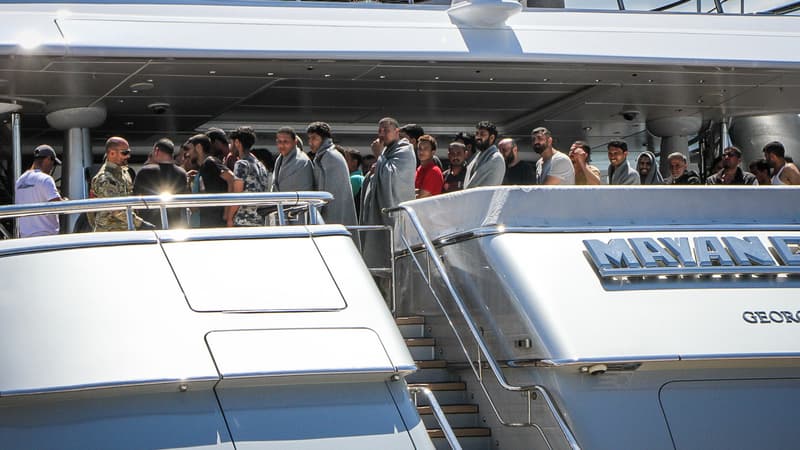At least 79 migrants died in the Ionian Sea off Greece, after the fishing boat they boarded sank. The search continues this Thursday, while hundreds of people were potentially on board, according to the Greek coast guard, raising fears that the number of victims will increase in the coming hours.
“It could be the worst maritime tragedy in recent years in Greece,” said Stella Nanou, of the UN High Commissioner for Refugees (UNHCR), on the public television channel ERT.
If 104 people were rescued according to the latest report provided this Thursday morning, the Greek port authorities say that the vessel had been sighted by a surveillance plane from the European agency Frontex, but that the passengers had refused any help.
Providing assistance to a vessel in distress, a fundamental principle
The salvage of a vessel at sea is governed by numerous international treaties that establish a basic principle: come to the aid of the shipwrecked, whatever their nationality. In fact, “saving lives at sea is not an option, nor a matter of political debate, but a secular obligation”, recalls the United Nations High Commissioner for Refugees, Filippo Grandi.
In fact, the United Nations Convention on the Law of the Sea establishes in particular since 1982 the obligation to provide assistance “to any person who is in danger at sea”.
Maritime law thus imposes that, when a ship is in danger, the closest vessels come to its aid, even if this means deviating from its trajectory. The only condition: “that the captain can do it without endangering his own ship and crew,” according to the disciplinary and criminal code of the merchant navy.
States obliged to come to the aid of the shipwrecked off their coasts
States also have very specific obligations in this area depending on the location of the wreck. In fact, the 1979 Convention on Maritime Search and Rescue stipulates that when a ship moves less than 22.2 km from the coast, it is in the territorial waters of the neighboring State and that the country in question must help or participate in the execution of relief operations. .
The 1979 convention calls for not only rescuing the shipwrecked, but also establishing research centers at sea or “Centros de Coordinación de Salvamento Marítimo” to organize the rescue of migrants.
In addition, “obliges States to provide first medical care to shipwrecked as well as to put them in a safe place.” This place of reception can be located on its coasts, but also on nearby foreign coasts, as long as the country concerned accepts it.
Therefore, the country that initiates the rescue does not have the obligation to welcome the survivors on its soil. This is where the situation gets complicated and can lead to certain problems when countries refuse to allow migrants to enter their territory. However, since 2004, amendments to the main maritime conventions require that migrants be placed in a safe place within a reasonable time.
For ships that sink in the central Mediterranean, passengers must be received by ports located in Italy or Malta, according to the United Nations High Commissioner for Refugees (UNHCR). In Libya there is no reception center for refugees who would automatically be detained there if they arrived in the territory.
Frontex in support
In order to help EU Member States and Schengen Associated Countries deal with shipwrecked people, since 2004 a European Border and Coast Guard Agency has also been operating in the Mediterranean Sea.
Three operations in total have been deployed to cover all Mediterranean waters: Operation Themis covers the Central Mediterranean, Operation Poseidon covers the Eastern Mediterranean, and Operation Indalo covers the Western Mediterranean.
Patrols are carried out there to come to the aid of shipwrecked migrants, while security work is carried out at the EU borders.
tensions between countries
The shipwrecked’s host country is supposed to take care of their asylum, according to UNHCR. A responsibility that not all States agree to assume. This was particularly the case last November when Italy refused to take over most of the shipwrecked migrants from the Ocean Viking, allowing only a few to go ashore. The issue had caused great tension between Rome and Paris, before the ship finally docked in Toulon.
The care of the migrants was then divided between different countries, as is allowed, although an official quota was never set. In the case of the Ocean Viking, France took over one third of the migrants, and the remaining two thirds were relocated to 9 voluntary European countries.
Regarding the shipwreck that occurred on Wednesday, the immigrant aid association SOS Méditerranée denounced, as usually happens, this Thursday on Twitter “the dramatic absence of effective search and rescue mechanisms” which, according to the NGO, “transformed the Mediterranean into a common place”. grave”.
SOS Méditerranée recalls the “obligations to coordinate and carry out rescue operations at sea” incumbent on States.
Since 2015, more than 25,000 people have died or been declared missing in the Mediterranean Sea and Atlantic Ocean trying to reach Europe, Frontex reports in its latest figures released in February.
Source: BFM TV


